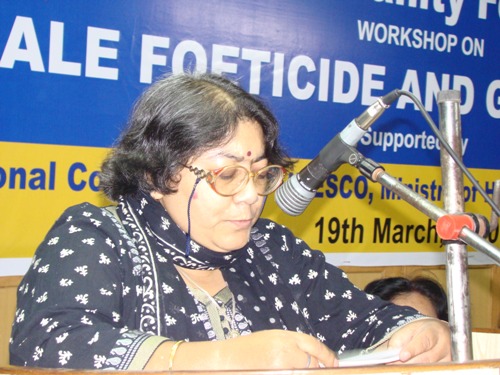19 Mar 2010|Noida | Amity University, Noida Campus, Sectoe-44
Workshop on Female Foeticide and Gender Justice held at Amity University
 Amity Humanity Foundation (AHF) conducted a workshop on “Female Foeticide and Gender Justice” under UNESCO’s theme of “Social and Human Sciences”. It has been granted by National Commission on UNESCO, Ministry of Human Resource Development, Government of India at Amity University, Noida, Sector-44
Amity Humanity Foundation (AHF) conducted a workshop on “Female Foeticide and Gender Justice” under UNESCO’s theme of “Social and Human Sciences”. It has been granted by National Commission on UNESCO, Ministry of Human Resource Development, Government of India at Amity University, Noida, Sector-44
The present project is in keeping with UNESCO’s background note on ‘Culture and Gender Equality’, which says, inter alia “Gender inequality manifests itself in the family, labour market, political-juridical structure, and in cultural-ideological production. At the same time, gender relations interact with other relations of inequality based primarily on social class but also on race,, religion, and sexuality to structure institutions and daily life. In this regard, it is important to understand and recognize how values,norms, and practices that are embedded in particular domains or social institutions may foster inequality, reinforce power differentials between the sexes, or perpetuate violence against women.” One of the main challenges to gender justice and concerns of gender equality in India is the phenomenon of female feticide. The Census 2001 revealed this ghastly side of son preference embedded in the Indian society. One of the inequalities being faced by the girl child is ‘natality inequality’ as highlighted by Amartya Sen.
Eminent panelists from Organisations and experts working on curbing the menace of Female Foeticide participated in the workshop. Ms. Meera Basu and Dr. Manasi Mishra, Head, Research & Knowledge Management Division represented Centre for Social Reasearch (CSR), M. Merchant and Ms. Safa Fanaian are from Bahai’s Office for advancement of women. Ms. Bijayalaxmi, a Senior Lecturer from Miranda House, Maj. Gen (Dr.) Surendra Kumar, VP, AHF and Dr. Chandra Rani Akhouri, Officiating Director, Amity Humanity Foundation coordinated in the workshop ‘Campaign Against Pre-Birth Elimination of Females’.
Maj. Gen (Dr.) Surendra Kumar, VP, AHF while delivering his inaugural address said that not only rural areas but affluent class people in urban areas do not prefer girl child. Dowry system is the predominant reason for female foeticide. The sex ratio is going down everyday. The legal system is not adequate enough to fight this menace. He further added that gender discrimination is also due to technology advancement.
Mrs. M. Merchant of Bahai’s Office for advancement of women asserted that the issue of the equality of men and women is of prime importance for the upliftment of the society. We have numerous challenges before us arising out of gender discrimination. According to Bahai community men and women are equal in the eyes of God. So our purpose of life should be to acquire the values of humanity. We consider the institution of family as a miniature of nation. If the family members are deprived of basic necessities of life, it would be a burden to society. So development in the attitude way of thinking of the people matters a lot in this aspect.
Dr. Manasi Mishra, Head, Research & Knowledge Management Division said that issues like child marriage, dowry system and female foeticide are prevalent in our society since time immemorial. But we the people are responsible for it and with our knowledge and effort can eradicate these social evils from the society. The utter negligence of the girl child is to be stopped. Proper food, health care and education of the girl child should be taken care off. Meri Shakti Meri Beti is a project which took place in Delhi. The shocking reality which came to the forefront is that India had lost 10 million girls because of female foeticide in the last twenty years. Community based awareness programmes has to be conducted for such mass death.
Ms. Bijayalaxmi Nanda, a Senior Lecturer from Miranda House, DU, while expressing her views said, “the gender injustice can be seen as a genocide. A whole gamut of human injustice comes from the gender injustice. The status of women was highly socially inferior. After independence there was acute poverty which deteriorated the condition of women in society. We have incentives and disincentives like the Ladli scheme which funds the girl child for its education and upbringing. But more such schemes need to be started to bridge the gap of gender inequalities.